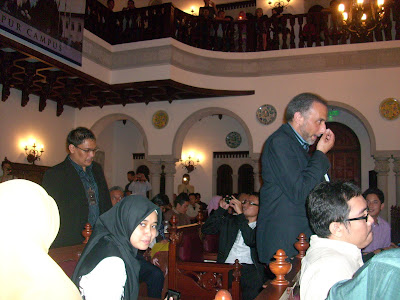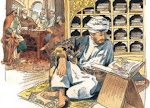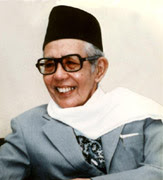 Cukup teruja mendengar ucapan menghurai sekitar nilai kebebasan dalam kerangka Islam. Tambahan pula cucu Hassan al-Banna ini merupakan seorang tokoh baru dunia Islam dan intelektual Islam yang giat membuka ruang interaksi antara Islam dan Barat.
Cukup teruja mendengar ucapan menghurai sekitar nilai kebebasan dalam kerangka Islam. Tambahan pula cucu Hassan al-Banna ini merupakan seorang tokoh baru dunia Islam dan intelektual Islam yang giat membuka ruang interaksi antara Islam dan Barat.Pertama kali juga saya teruja tatkala sampai ke ISTAC (International Institute of Islamic Thought). Bangunan ala-ala Andalusia, Granada mengingatkan saya seakan-akan berada di zaman emas Islam Andalusia. Rekaan bangunan dihiasi lukisan-lukisan menarik era kegemilangan Sultan Muhammad al-Fateh sungguh menghidupkan suasana.

Memabaca dan melihat gambar ISTAC sebelum ini sungguh tidak jauh dari realiti. Prof Syed Muhammad Naquib al-Attas memang benar seorang tokoh Falsafah Islam yang hebat merangka sebuah bangunan yang cukup indah.
Tajuk wacana di ISTAC pada malam itu bertajuk Is Liberty An Islamic Value ? Persoalan yang timbul ialah bagaimana kita berinteraksi dengan kebebasan? Boleh dikatakan ramai yang hadir terdiri dari pelajar ISTAC ( pelajar M.A dan PHD ), Profesor, ahli akademik, golongan 'middle-upper class' yang agak moden dan golongan mahasiswa seperti saya.
Muqaddimah wacana Prof Tariq meningatkan para pendengar agar tidak menepuk tangan atau ber 'takbir' apabila beliau memberi ucapan. Inginkan suasana yang tenang. Kata beliau 'Takbir' is beyond of what you say in louder. Takbir sepatutnya lahir dari perasaan yang meresap dihati. Tidak perlu melaungkannya. Kritikan pertama beliau. Kritikan kedua 'dont only to repeat what the Quran, Hadith, ulama say, but to think". Jangan hanya pandai 'quote' ayat-ayat al-Quran dan Hadith atau kata ulama tanpa memahami maksud , tanpa berfikir dan mengkaji.

Kebebasan Intipati Kehidupan
Kemudian sekitar ucapan beliau yang sepat diambil ialah nilai kebebasan dalam Islam sudah lama dihuraikan. Kalimah "Laa Ilaha Illalah is to liberate yourself from any evil". Kebebasan merupakan intipati kehidupan manusia Islam, 'freedom of being is the essence'. Tidak berlawanan dengan fitrah. Semua inginkan kebebasan. Tetapi setiap dari manusia perlu bertanggungjawab terhadap kebebasan yang diterima dari Tuhan. "If you are free you will have responsibity'. Bertanggungjawab untuk diri , sesama manusia (termasuk non-muslim) , agama dan Tuhannya.
Mengingatkan saya tentang apa yang disebut oleh Syeikh Yusof al-Qardawi. Kebebasan boleh diibaratkan seperti pisau. Boleh digunakan untuk keburukan dan kebaikan.
Kebebasan Sebenar Melepaskan Diri Dari Ego
" True liberty is freedom yourself from ego, liberate yourself from ego, evil and etc". Kebebasan yang sebenar ialah membebaskan diri kita dari perasaan ego, kejahatan, dosa, maksiat dan perbuatan buruk lain. Kerana semua manusia secara fitrah tidak suka kepada keburukan dan sukakan kebaikan.

Kebebasan dalam Kerangka Maqasid Syariah
Walau pun kebebasan merupakan 'natural needs'. Tetapi keperluan azali manusia perlu dipandu dengan objektif. Maqasid Syariah ( objektif pengaplikasian syariah) memandu kebebasan manusia. Kebebasan perlu dilihat dari kaca mata berasaskan maqasid. Termasuk darinya ialah perkara Darurah seperti agama , nyawa, maruah, keturunan, aqal. Katanya kebebasan tidak bermaksud semua manusia boleh melakukan sesuka hati sehingga menggadaikan maruah. Kebebasan dipandu maqasid 'protect the dignity'. Menyelamatkan maruah manusia. "The diginity is to try protect your best, good with what you know".
"Put rules (obejctives) to protect the freedom".
Akhir
Saat akhir sesi pertanyaan timbul satu suasana intelektual yang cukup teruja. Begitu ramai berrtanya dan berhujjah. Sehingga wujud satu provokasi dari seorang pemuda yang mengkritik Prof Tariq Ramadhan mengatakan apa yang dikatakannya tentang kebebasan tidak ada dalam dalil dan jauh menyimpang dari pemikiran datuknya Hassan al-Banna. Agak tegang tetapi beliau penuh profesional menjawab.
Tamat pengalaman menghadiri wacana yang penuh ibrah dan meluaskan pandang alam kehidupan.



